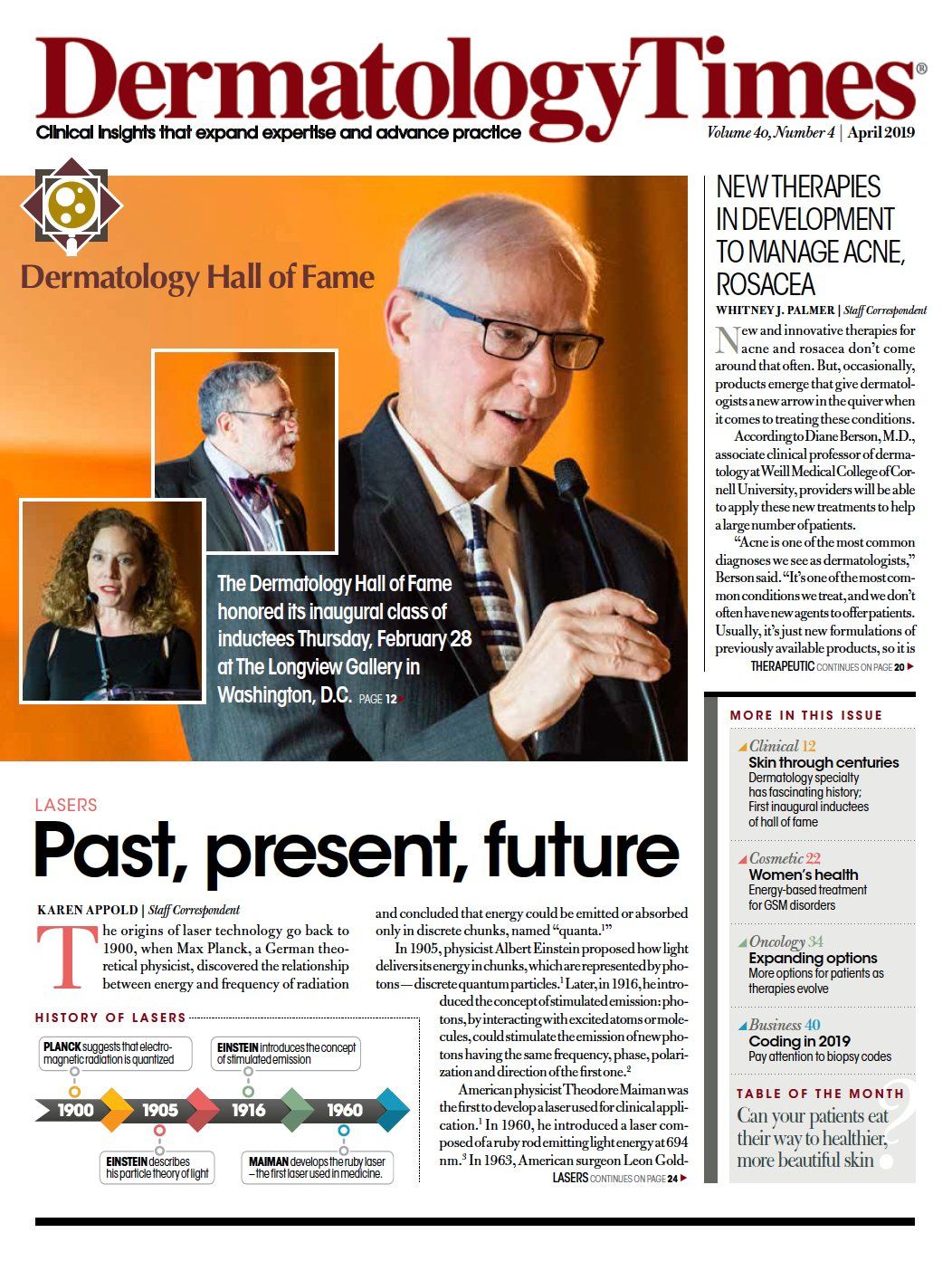- Acne
- Actinic Keratosis
- Aesthetics
- Alopecia
- Atopic Dermatitis
- Buy-and-Bill
- COVID-19
- Case-Based Roundtable
- Chronic Hand Eczema
- Drug Watch
- Eczema
- General Dermatology
- Hidradenitis Suppurativa
- Melasma
- NP and PA
- Pediatric Dermatology
- Pigmentary Disorders
- Practice Management
- Precision Medicine and Biologics
- Prurigo Nodularis
- Psoriasis
- Psoriatic Arthritis
- Rare Disease
- Rosacea
- Skin Cancer
- Vitiligo
- Wound Care
Publication
Article
Dermatology Times
The evolution of skin cancer
Author(s):
Learn about the most important surgical and medical advancements in skin cancer treatments as they developed over time.
Recorded history has shown that physicians have always tried to best treat skin cancers with the therapeutic means and medical knowhow of the period. In the more modern era, a myriad of skin cancer treatments has developed and evolved over time including curettage and electrodessication, standard surgical excision, Mohs micrographic surgery, radiation therapy, cryosurgery, topical medications, laser surgery, photodynamic therapy (PDT), as well as evolving immunotherapies.
The breakthroughs in both surgical and medical treatments were significant in their own time; however, according to one expert, some advances in skin cancer treatment stand out more than others.
“There have been many important breakthroughs in the evolution of skin cancer therapy, some on the surgical level, such as Mohs surgery, and some on the medical level, such as the dawn of the immunomodulators; all of which have significantly contributed to advancing skin cancer treatment,” said Tobechi L. Ebede, M.D., dermatologist and fellowship-trained Mohs surgeon, Plaza Park Dermatology, Brooklyn, New York.
Historically, skin cancer treatments consisted of some form of destruction or surgical removal of the tumor. From the surgical aspect, Dr. Ebede believes that Mohs micrographic surgery is likely one of the most important breakthroughs in the timeline of skin cancer treatment evolution. The technique is considered by many as the most effective treatment approach for removing BCC and SCC, and it is being increasingly used as an alternative to standard excision for some cases of melanoma. According to Dr. Ebede, Mohs surgery is proven to have the highest cure rate at 99% for first-time skin cancers and 94% for recurrent tumors.
“Mohs micrographic surgery made a huge impact on the treatment of skin cancer. The procedure can be completed in one visit under local anesthesia, and you can evaluate 100% of the tumor margin while the patient is in the office,” Dr. Ebede says. “With Mohs surgery, dermatosurgeons can spare much of the healthy tissue they normally would be removing via standard excision, leaving only a small scar for the patient who will go home cancer free. Not many other modalities can tout such an effective and efficient procedure for skin cancer treatment.”
Even within Mohs micrographic surgery, there have been recent advancements and refinements of the procedure where dermatopathologists are now staining excised frozen tissue sections with a melanoma antigen recognized by T cells (MART-1) to better identify melanomas such as melanoma in-situ.
According to Dr. Ebede, this significant breakthrough within Mohs surgery will be a catalyst for pathologists to more often use and incorporate the host of immunostains available to them into Mohs surgery.
From the medical treatment aspect, Dr. Ebede believes that immunotherapy is by far one of the most significant skin cancer treatment advances in modern times.
“If you look at past psoriasis and eczema treatments where the immune system was routinely globally suppressed causing so many cutaneous and systemic side effects, compared to the targeted therapy we now have where you can pinpoint specific targets within the immune system, also helping to reduce the side effects of treatment. I believe the same dynamic will also continue to be seen with skin cancer and novel evolving immunotherapies where we can fine-tune our targets without destroying the whole immune system in the process,” Dr. Ebede said.
Another advance in skin cancer immunomodulatory therapy with a novel administration is vismodegib (Erivedge, Genentech), which was a major breakthrough for those patients with advanced BCC. According to Dr. Ebede, being able to offer an oral therapy for those patients with advanced or metastatic BCC who, prior to this breakthrough, were destined to multiple surgeries and radiation procedures with all of the risk-consequences and adverse events associated with those approaches was more than welcome for this patient population.
“We’ve always known that hedgehog pathway signaling was important in BCC and having such a targeted therapy in pill form is really a significant therapeutic breakthrough. This advance was particularly welcome for patients with Gorlin syndrome who end up developing countless BCCs. Vismodegib helps them reduce the number of BCCs that develop over time, offering them a medical therapy alternative to the traditional cornerstone surgery and radiation approaches,” Dr. Ebede said.
According to Dr. Ebede, combination therapies and a refinement of current modalities are likely the future of skin cancer treatments. Certain patient populations can particularly benefit from combination therapy Dr. Ebede said, such as those with field cancerization. Field cancerization is an aspect the clinician must consider when examining patients with BCC, SCC, and particularly those with multiple actinic keratoses (AK). Dr. Ebede will often combine a surgical removal of the primary tumor followed by field therapy such as ALA-PDT treatment to address the field cancerization lurking in the area. Other field therapy options the clinician can use to address field cancerization include topical imiquimod and 5-fluorouracil.
“These topical immunomodulators activate themselves versus light-activated PDT that help clear the irregular cells in the target area. Among the immunotherapy breakthroughs, these topical therapies have made a big impact in skin cancer treatment in terms of helping patients avoid multiple surgeries,” Dr. Ebede said.
Disclosures:
Dr. Ebede reports no relevant disclosures.

Newsletter
Like what you’re reading? Subscribe to Dermatology Times for weekly updates on therapies, innovations, and real-world practice tips.





























